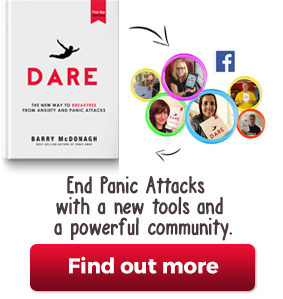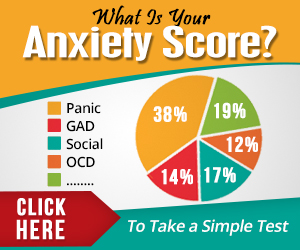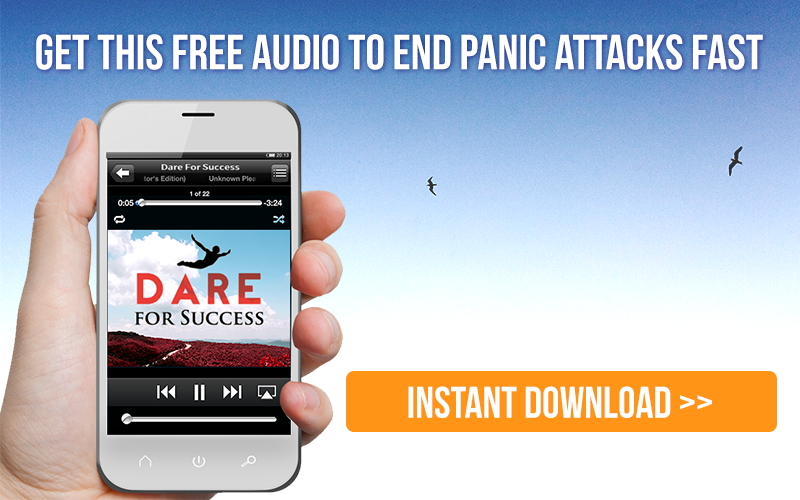Panic Attacks and a Fear of Heart Attack
Click play to hear Barry explain this anxiety sensation.
Here’s a typical scenario of getting anxious about your heart:
“While sitting at my desk, I was feeling edgy, and I could feel my pulse rate increase. I kept working, and then I felt pins and needles going up my left arm. I immediately thought to myself, “I’m having a heart attack.” Literally seconds later, my heart was racing. I then looked around to see if there was anyone at the office. I was by myself . . . I really thought I was having a heart attack or stroke. Knowing I was alone, with no one to help me, made me feel more desperate and scared. I ended up calling 911. After extensive tests at the hospital, they told me it was anxiety. Even though I know it’s just anxiety related, I can’t help worrying that they may have missed something, I’ve become paranoid and check my pulse all the time. I also get really frightened if my heart beats fast or skips a beat.”
Most people who have experienced panic attacks at some point fear for the health of their heart. It goes without saying that everyone should investigate any unusual symptoms in their chest or heart. Heart disease almost always produces major electrical changes in the heart, which are picked up very obviously by an EKG. In panic attacks, the only change that shows up on the EKG is a slight increase in heartbeat.
If you’re worried about heart problems, treat yourself to a full examination, and put your mind to rest. If you’ve had a full medical examination and the doctor has cleared you, you can safely assume that you don’t have heart problems.
Let’s first look at the facts of heart disease and see how this differs from panic attacks. The major symptoms of heart disease are breathlessness and chest pain as well as occasional palpitations and fainting.
Such symptoms are generally related to the amount of physical effort exerted—that is, the harder you exercise, the worse the symptoms, and the less you exercise, the better. The symptoms usually go away quickly if the individual rests. This is very different from the symptoms associated with panic attacks.
Palpitations
Palpitations are short, abrupt periods in which the heart suddenly starts beating fast. If you’re in a sensitive state, this can ring alarm bells because you fear a sudden heart attack. The more you panic, the faster the heart beats. It’s therefore understandable why many people in this situation jump to conclusions and call for medical help. What you have to remember is that palpitations are perfectly natural and can often be caused by exhaustion or stimulants like caffeine. Your heart is an incredibly strong muscle, and it won’t stop or explode simply because it’s beating hard and fast. A healthy heart can beat fast all day long and not be in any danger.
Missed Heartbeats
The medical term for missed heartbeats is extrasystoles. A missed heartbeat is usually an extra beat between two normal beats. Given the pause that follows this premature beat, it just seems as if one beat was missed. And because the heart’s lower chambers fill with a greater-than-usual amount of blood during the pause, the next regular heartbeat can feel like a bit of a jolt. When you feel this sensation, you often freeze and wait in terror to see if your heart is in trouble.
Such missed beats are generally harmless. It can help to sit down when you feel this sensation, but if you wish to keep moving, do so. Exercise won’t cause the situation to get worse, and don’t convince yourself that going home to lie down is the only way to help the situation. If you retreat every time you feel an unusual sensation, that behavior can reinforce a negative idea that your home is the only safe place to be. Our hearts are not atomic clocks that always keep time; they speed up, slow down, or occasionally beat in an irregular fashion. People with anxiety are very keen observers of all bodily functions. From time to time, you may notice an irregular beat or two. This is nothing to get upset about.
Sometimes, individuals go through similar worries about their heart as they do with their breathing. People convince themselves that if they worry enough about their heart, or concentrate too much upon its actions, it may somehow get confused and forget how to beat correctly. It’s quite common for people who suffer from panic attacks to check in on their heart at regular intervals to make sure it’s still beating away.
If you simply can’t stop obsessing about your heart, here are some tips:
• Get a full medical examination. If you don’t, your mind will always bring up the “what if something really is wrong” card. When you get a clean bill of health, trust in the results and don’t second-guess them. If you really must, get a second opinion—but after that, stop doubting your good health.
• Remember that your body has incredible internal intelligence. Simply telling your heart, out of panic, that it might stop doesn’t mean that it heeds your fears. Learn to become more comfortable with your heart, and let it do its job. Listen to it when you’re relaxed and also when you’re exercising. The more comfortable you are with the diversity and range of your heartbeats, the more confidence you’ll have in it.
• Allow your heart to beat in whatever rhythm it sees fit. Don’t try to control the natural rhythms of your body by always insisting on a calm heartbeat. The more you allow your body to flow in the manner it so chooses, the faster it will return to a state of rest.
Very often, your heart only wants to palpitate a bit, thump a few beats harder. Why? That’s the heart’s own business. It’s your mind that interferes and panics, causing the adrenaline to kick off a longer cycle of rapid heartbeats. So from now on, make a verbal agreement with your heart that you’re going to stop interfering and obsessing over its health and trust in it 100 percent. Then hand over the controls. Let go to whatever way your heart wishes to behave. By allowing the sensations to happen and simply getting on with your day, you release the anxiety that you hold around your heart as well as the cautious monitoring of every heartbeat.




